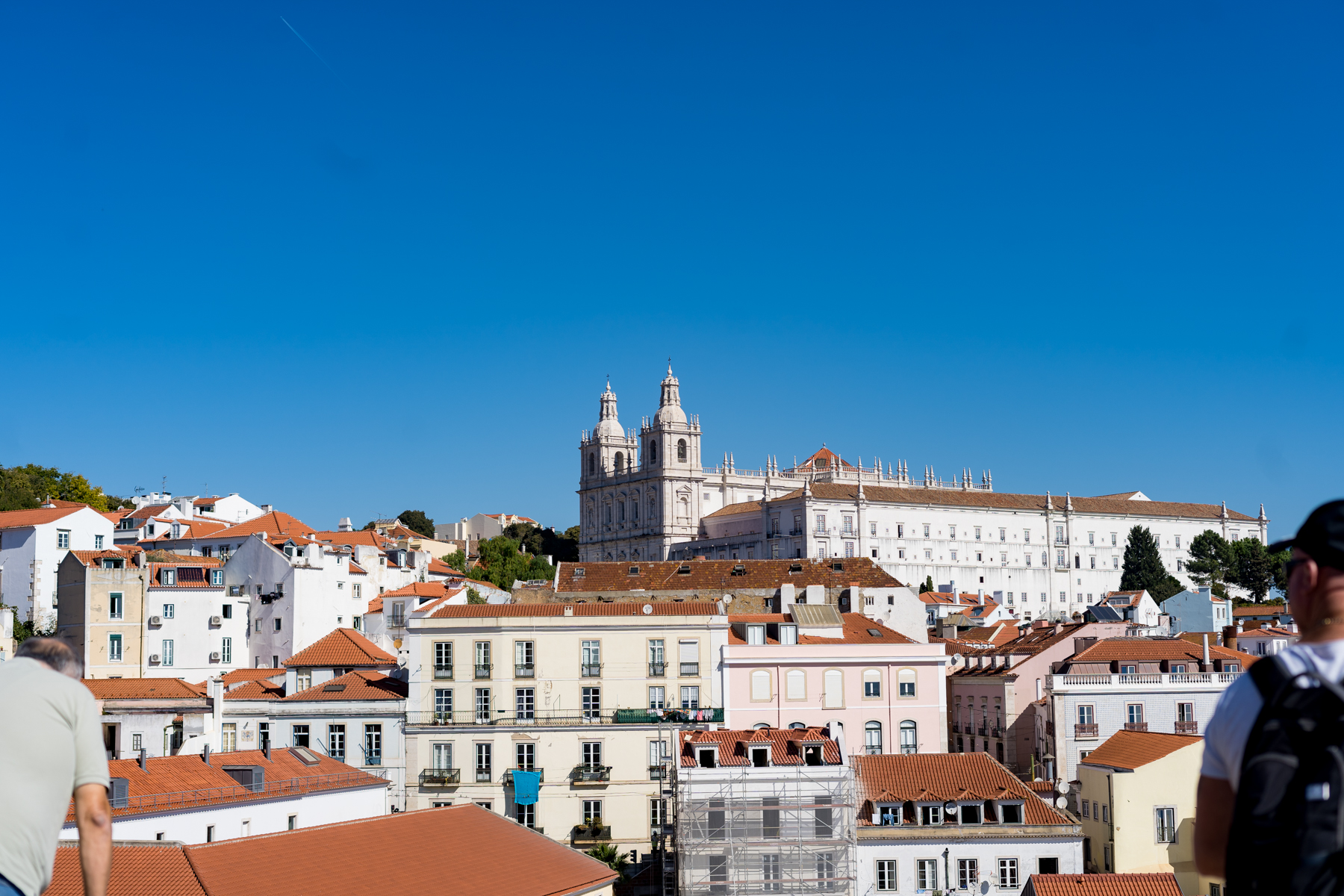I can’t believe it will soon be 2023, which means the Pandemic started 4 years ago. I still feel like it has only been 2 years. I guess you can blame the post-Covid brain fog when it comes to the calendar. The pandemic shook the world upside down like a mom checking for loose change before doing laundry. Portugal is trending as a hot location for people to move to, and I don’t blame them. Here are my tips on how to move to Portugal in 2023.

Table of Contents
Why are people moving to Portugal?
People are moving to Portugal for a variety of reasons. Some are drawn to the country’s beautiful landscapes and mild climate, which offers sunny days and warm temperatures throughout the year. Others are attracted by the low cost of living and the affordable real estate prices, which make it possible to live comfortably on a budget. Additionally, Portugal has a rich culture and history, with beautiful cities and towns to explore, as well as a vibrant arts and music scene. Finally, many people are drawn to Portugal’s friendly and welcoming people, who are known for their hospitality and warm personalities. Overall, Portugal offers a high quality of life and a unique experience for those who decide to move there.
Let’s dive deeper into the benefits of moving to Portugal, shall we? First and foremost, Portugal is an extremely affordable place. Many people and families have moved since 2020 especially, giving reasons such as lower rent, food, healthcare and transportation costs than the USA. Those who have already moved thanks to incentives offered by the Portuguese government, like the “golden visa’ program, are now happily enjoying all of those benefits. (The golden visa, also known as the residence-permit or real-estate visa, offers residency to foreigners who buy homes priced at 500,000 euros or more.) I’ll talk more about the visas later in this blog.
Other reasons for moving that expats mention include retirement, being closer to the ocean, or just a more relaxing way of life. Some even mentioned the ability to get their children free college in the future after they become Portuguese citizens. These first-person stories from people who made the move to Portugal are interesting and include perspectives from local residents of larger cities that will get you thinking.

What to Do Before Moving to Portugal
If you are planning a move to Portugal, there are a few key steps that you should follow to ensure a smooth and successful transition. These steps include:
Research: Start by learning as much as possible about Portugal, including its culture, climate, and cost of living. This will help you decide where to live and what to expect from your new home. Also, research the types of visas you can apply for and their qualifications. Some of these visas will require you to have private health insurance, so before you move to Portugal, do your homework.
Plan: Once you have a general idea of where you want to live and what you want to do in Portugal, you can start planning your move in more detail. This should include researching the best way to move your belongings, finding a place to live, and arranging for any necessary visas or permits.
Budget: Moving to a new country can be expensive, so it’s essential to plan your budget carefully. This should include not only the cost of moving but also the cost of living in Portugal, including housing, food, transportation, and any other expenses you may incur.
Pack: As your move date approaches, start packing your belongings. Be sure to pack only what you need, and consider using a professional packing service to ensure that your belongings are properly protected.
Move: Once everything is in order, it’s time to make the move to Portugal. This can involve hiring a moving company, renting a vehicle, or arranging for transportation of your belongings.
Overall, the key to a successful move to Portugal is to plan ahead and be prepared for any challenges that may arise. By following these basic steps and doing your research, you can make your move to Portugal as smooth and stress-free as possible.

What Should You Pack for an International Move?
When packing for a move to Portugal with your family, it’s important to consider the climate, your living arrangements, and your family’s needs and preferences. Here is a general packing list to get you started:
Clothing: Pack a variety of clothing for all seasons, including light, breathable clothes for the warmer months and warmer layers for the cooler months. Be sure to include comfortable walking shoes and any specialized clothing you may want right away before you can shop, such as swimsuits or hiking gear.
Toiletries: Pack all of your essential toiletries, including toothpaste, shampoo, soap, and any medications you or your family may need.
Electronics: Bring any electronics that you or your family may need, including laptops, tablets, smartphones, chargers, and your CPAP. Be sure to purchase a voltage converter, or risk damaging your electronics. You can also find combination plug adapters with the voltage converter built in.
Documents: Be sure to pack any important documents, such as passports, visas, and birth certificates. You may also want to bring copies of important documents, such as your insurance policies and medical records. When the time comes, every person should have a hidden money belt or anti-theft travel bag so the most important documents can be carried on you.
Kitchen items: If you are moving into a furnished apartment or home, you may not need to bring many kitchen items. However, if you are moving into an unfurnished space, you may want to pack a few basic kitchen items, such as dishes, utensils, and small appliances. Focus on your favorites that feel like home.
Personal items: Finally, be sure to pack any personal items that are important to you and your family, such as photos, mementos, and books. These can help make your new home feel more familiar and comfortable.
To summarize all this, the key to packing for a move to Portugal with your family is to pack only what you need, but to still be prepared for any eventuality. Easy, right? By following this packing list and doing your research ahead of time, you can gain some ground on making your move to Portugal smoother and less stressful.
Also if you are considering moving to Portugal, I suggest you first visit the country. Here are some blog posts that may help with planning your Portugal Trip.
- Portugal in the Fall
- Everything you need to know about Portugal in December
- Stress-Free Travel Tips to Lisbon
- Also Check out Italy Nomad Digital Visa

Where is the Best Place to Move to in Portugal?
Without a doubt, Portugal is a beautiful country with many great places to live. Some of the most popular places to live in Portugal include:
Lisbon: Lisbon is Portugal’s capital and largest city, known for its vibrant culture, rich history, and beautiful architecture. From the cobbled streets of the Alfama district to the bustling Baixa neighborhood, Lisbon offers something for everyone.
Porto: Located in the northwest of Portugal, Porto is the second-largest city in the country and a popular destination for tourists and expats alike. With its lovely and walkable streets, historic buildings, and delicious cuisine, Porto is a great place to live.
The Algarve: The Algarve is Portugal’s southernmost region, known for its stunning beaches, beautiful landscapes, and mild climate. The Algarve is a popular destination for retirees and those looking to enjoy a relaxed lifestyle by the sea.
Coimbra: Located in central Portugal, Coimbra is a historic city with a rich culture and a vibrant student population. With its beautiful old town, charming cafes, and picturesque river, Coimbra is a great place to live for those who love history and culture.
The Azores: The Azores are a group of nine volcanic islands located in the Atlantic Ocean. With their stunning landscapes, pristine beaches, and laid-back atmosphere, the Azores are a great place to live for those who love nature and outdoor activities.

In the end, the best place to live in Portugal depends on your own personal preferences and lifestyle. Whether you prefer the hustle and bustle of a metro area, the tranquility of a small town, or simply a stunning seaside view, Portugal has something for everyone.
Expat Communities In Portugal
There are many expat communities in Portugal, with people from all over the world choosing to live and work in this beautiful country. Some popular expat communities in Portugal include:
Lisbon: Lisbon is Portugal’s capital and largest city. The metropolitan energy and its lively neighborhoods have attracted a diverse expat community here.
Porto: Porto has a vibrant culture, rich history, and beautiful architecture, and expats find it a great place to live and work.
The Algarve: With its laid-back atmosphere and mild climate, it’s a popular destination for retirees and those looking to enjoy a relaxed lifestyle by the sea.
Coimbra: Coimbra is a great place for expats who love history and culture.
The Azores: With their stunning landscapes and laid-back atmosphere, the Azores are a popular target for expats who love nature and outdoor activities.

Portugal is a welcoming and diverse country with many great expat communities. To find out where you might run into a group of expats from your area in Portugal, look to social media. Facebook has specific groups just for that. For example, there is one just for Californians who have migrated to the country. And who knows, you may just find a new group of friends who are going through the same new things, but who can also anchor you and remind you of the familiar.
Portuguese Residence Permit qualifications
There are several types of residence permits available in Portugal, each with its own requirements and conditions. Some of the most common types of residence permits include:
Temporary residence permit: This type of permit is issued to non-EU nationals who need to stay in Portugal for more than 90 days for a specific purpose, such as studying, working, or conducting research. To qualify for a temporary residence permit, you must have a valid passport, proof of sufficient financial means to support yourself during your stay, and a valid reason for your stay in Portugal.
Permanent residence permit: This type of permit is issued to non-EU nationals who have legally lived in Portugal for at least five years. To qualify for a permanent residence permit, you must have a valid passport, proof of sufficient financial means to support yourself, and a clean criminal record.
Family reunification permit: This type of permit is issued to non-EU nationals who are married to a Portuguese national or who have children who are Portuguese citizens. To qualify for a family reunification permit, you must have a valid passport, proof of your relationship with the Portuguese national, and sufficient financial means to support yourself and your family.
EU Blue Card: This type of permit is issued to highly skilled non-EU nationals who have a job offer in Portugal in a field that requires specialized knowledge. To qualify for an EU Blue Card, you must have a valid passport, a job offer in a qualified occupation, and a higher education degree or equivalent professional experience.
Digital nomad visa: This type of permit is issued to non-EU nationals who work remotely and earn at least €2,800 per month. To qualify for a digital nomad visa, you must have a valid passport, proof of your remote work and income, and a plan to work and live in Portugal.

It is important to note that the requirements for each type of residence permit may vary and are subject to change. It is always best to check with the Portuguese authorities or a legal professional for the most up-to-date information on the qualifications for each type of residence permit.
Who Qualifies for a Residency Visa to Portugal?
There are multiple visas to apply to qualify for residency in Portugal, and within each of those types there are multiple actions you can take to meet the requirements.
The main visa types are the D7 (also known as the ‘passive income visa’), golden visa, and (spoiler alert) the new digital nomad visa. And if you have parents, grandparents or great-grandparents that are from an EU country, you may be eligible for citizenship in the EU.

The D7 Visa, a.k.a. ‘Passive Income’ Visa
This option for Portuguese residency is the oldest and simplest, yet it’s also the most restrictive in terms of how to qualify. It’s known as the passive income visa or the retirement visa because the requirements are:
You must earn at least €760 per month from pensions, transferable equity, real estate, intellectual property, or financial equity.
You must be willing to reside for more than 183 consecutive days per calendar year in Portugal.
You must be a non-EU national.
You have to show proof of a place to live in Portugal.
If you’re hoping to qualify for a residency visa based on active earned income, the D7 is not for you. This is why Portugal devised the ‘golden visa’ in 2012, to allow more people an avenue for living there permanently, which would bring more money into the country. More information on the D7 visa can be found here if you think you may qualify.
https://www.globalcitizensolutions.com/portugal-d7-visa/
The Portugal Golden Visa
The most interesting thing about the golden visa is that applicants are only required to spend seven days (just one week!) in the first year in Portugal, then just 14 days every two-year period after that. For a visa that helps people come to live in Portugal, you might have noticed they really don’t care if you’re actually there, in this case. The country wanted to have an influx of money, but not so much to increase the general population. Well, maybe to their surprise, people came to stay anyway, and why wouldn’t they? Another benefit to this visa is you can apply for national citizenship after only 5 years.
Even though the focus has been put on real estate investments to qualify, there are actually other investment options to choose from, like investment funds, capital transfer, and business set-up. You can get more information about the ins and outs of the golden visa requirements here.
https://www.globalcitizensolutions.com/golden-visa-portugal/

Changes to the Golden Visa Program in 2022
One of the consequences of the popularity of the golden visa program has been some pushback due to all the influx of people, which has raised real estate prices in popular areas. Therefore, this type of visa is no longer available in some of those popular locations for residential property, and you can’t apply for those areas for the Portugal golden visa anymore (as of January, 2022). Right now this includes Lisbon, Porto and the Algarve. You can find out about specific locations on this linked document. The names of the cities are on pages 2-4.
https://getgoldenvisa.com/wp-content/uploads/2021/02/Portugal-Golden-Visa-2021-GetGV.pdf
The amount required to invest in property also increased from 350,000 to 500,000 euros, a move that was intended to lower the overall number of applications. The good news is, if you submitted a golden visa application before December 31st, 2021, these restrictions aren’t retroactive and none of them apply to you.

A New Visa Option for Digital Nomads
The 2022 restrictions to the golden visa rules don’t have to be the end of your big life adventure. It just means there are a few restrictions on where you can settle. Although the changes can be a serious blow to some people’s plans, there is actually a new type of visa that focuses on a specific segment of workers, and that is the digital nomad visa. If you just can’t get Lisbon, Porto or the Algarve off your mind, and you can earn at least 2,800 euros per month (about $3,000 USD) doing remote work, you can apply for a temporary-stay visa of up to one year, or a residency permit that can be renewed for up to five years, and that includes the newly restricted areas of the golden visa. You can live wherever you can afford to. While it isn’t the same as moving with the intention of becoming a Portuguese citizen, it could be just right for you if you aren’t sure you’re ready to make a permanent move or invest in property overseas.
Health Insurance in Portugal
Health insurance is mandatory for all residents in Portugal, regardless of their nationality. There are two main types of health insurance in Portugal: the public National Health Service (Serviço Nacional de Saúde or SNS) and private health insurance.
The National Health Service (SNS) is a public, universal healthcare system that is free for all Portuguese citizens and residents. It is funded through taxes and provides access to a range of medical services, including hospital care, primary care, preventive care, and specialist care.

Private health insurance is an optional, additional form of coverage that can be purchased by anyone, including Portuguese citizens and residents. Private health insurance can provide access to a wider range of services and faster treatment than the SNS, but it usually comes at a cost. Private health insurance plans can be purchased from private insurance companies or through employer-sponsored group plans.
If you are a non-EU citizen living in Portugal, you may be required to have private health insurance as a condition of your residence permit. It is important to check with the Portuguese authorities or a legal professional to determine the specific health insurance requirements for your situation.
Private Health Insurance in Portugal
Private health insurance in Portugal is an optional form of coverage that can be purchased by anyone, including Portuguese citizens and residents. Private health insurance can provide access to a wider range of medical services and faster treatment than the public National Health Service (Serviço Nacional de Saúde or SNS), but it usually comes at a cost.
Private health insurance plans in Portugal can be purchased from private insurance companies or through employer-sponsored group plans. Private health insurance plans may vary in terms of the coverage they provide, the cost of premiums, and the exclusions and limitations of the policy. It is important to carefully review the terms and conditions of a private health insurance plan before purchasing it to ensure that it meets your needs and budget.
Private health insurance in Portugal can cover a range of services, including hospital care, primary care, preventive care, specialist care, and dental care. Some private health insurance plans may also cover alternative therapies, such as acupuncture or chiropractic care. Private health insurance may also provide coverage for medical expenses incurred abroad, depending on the policy.
If you are a non-EU citizen living in Portugal, you may be required to have private health insurance as a condition of your residence permit. It is important to check with the Portuguese authorities or a legal professional to determine the specific health insurance requirements for your situation.









